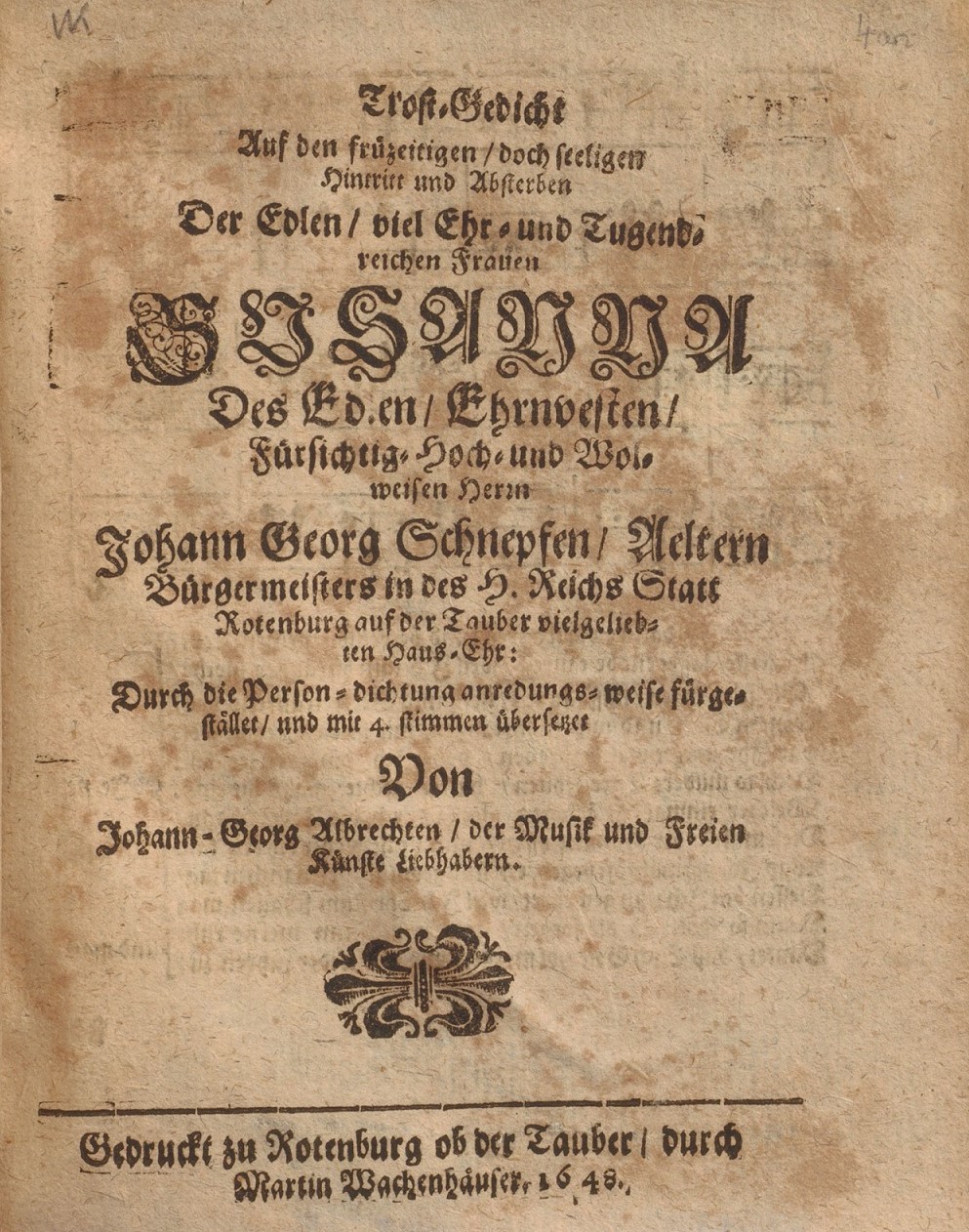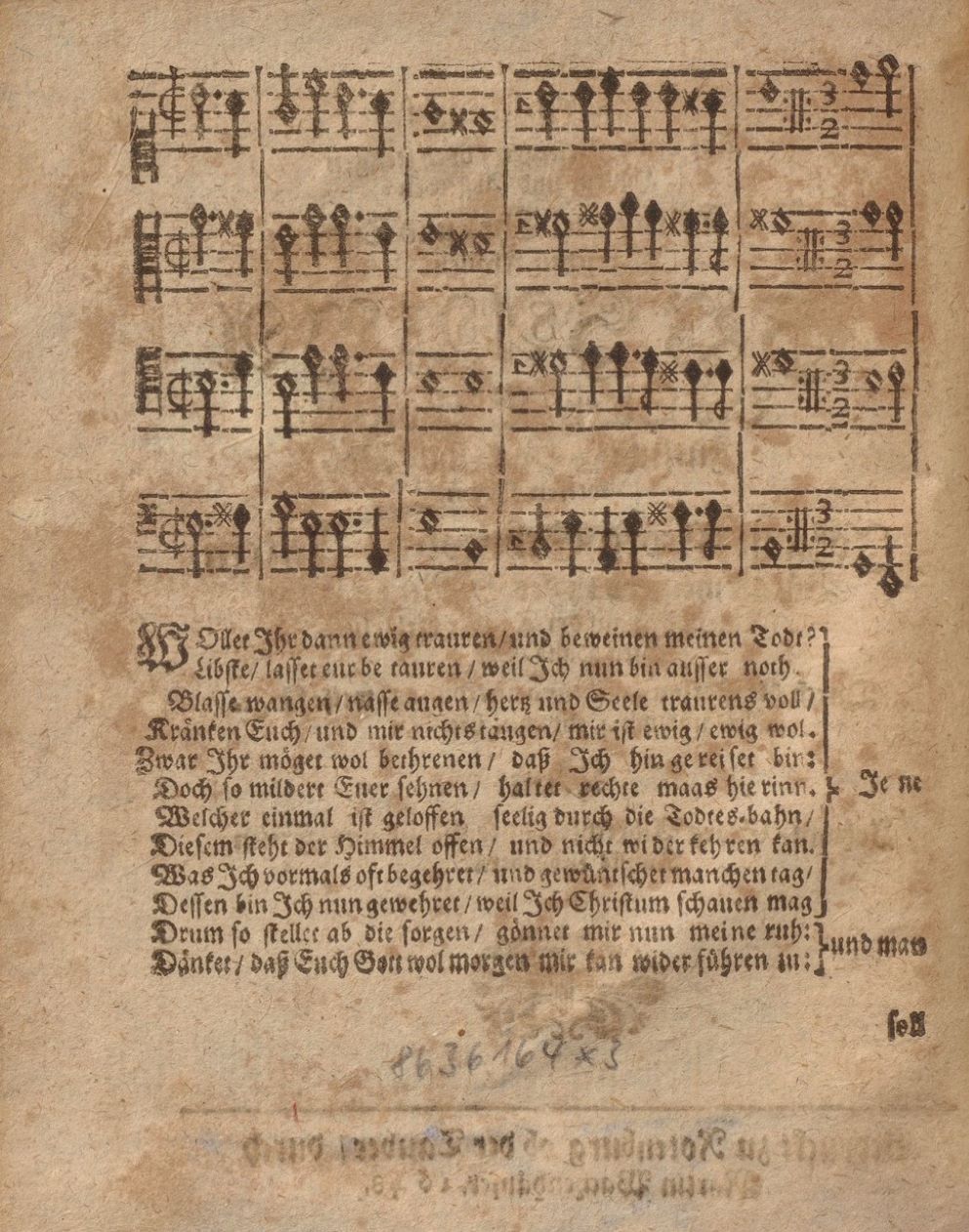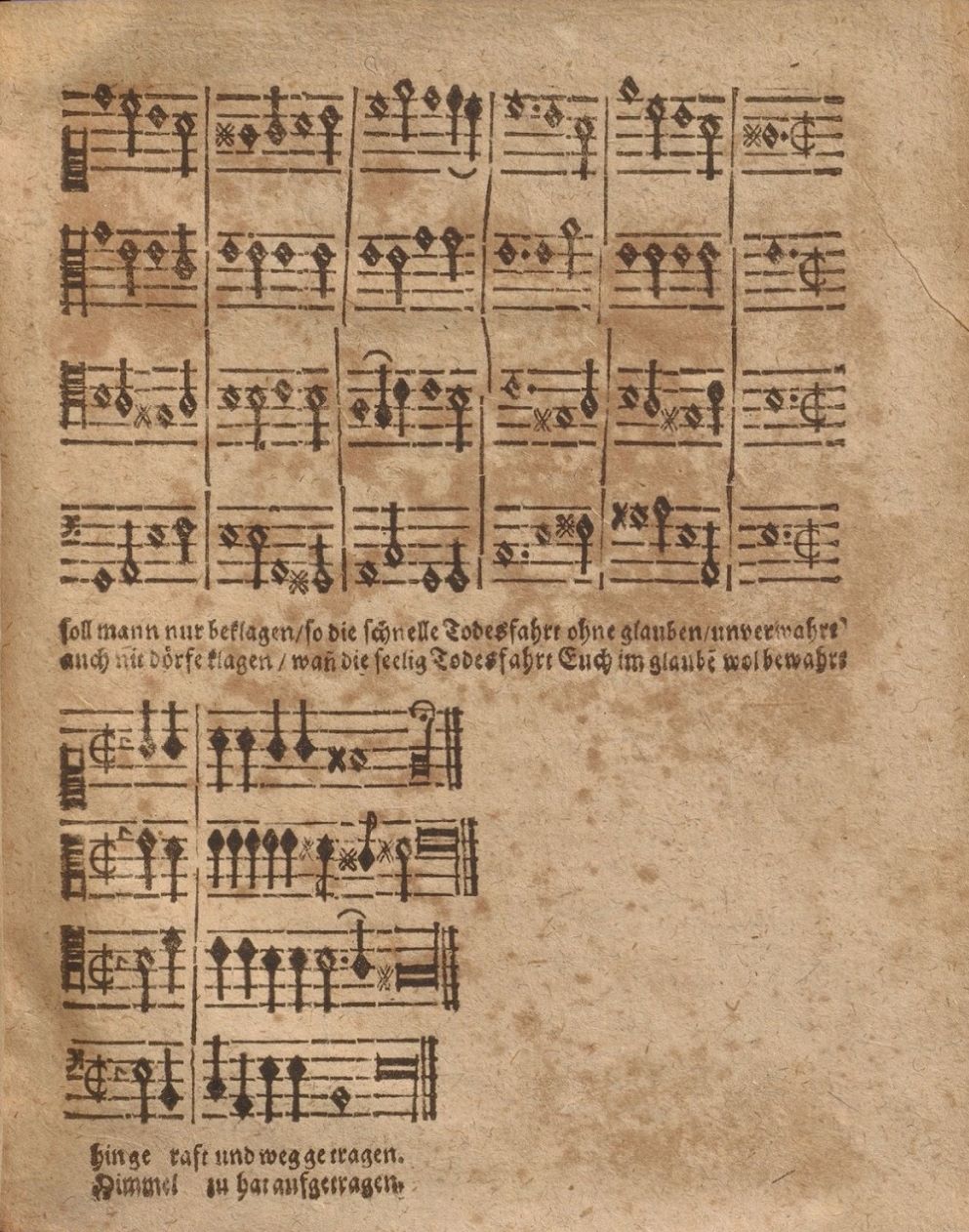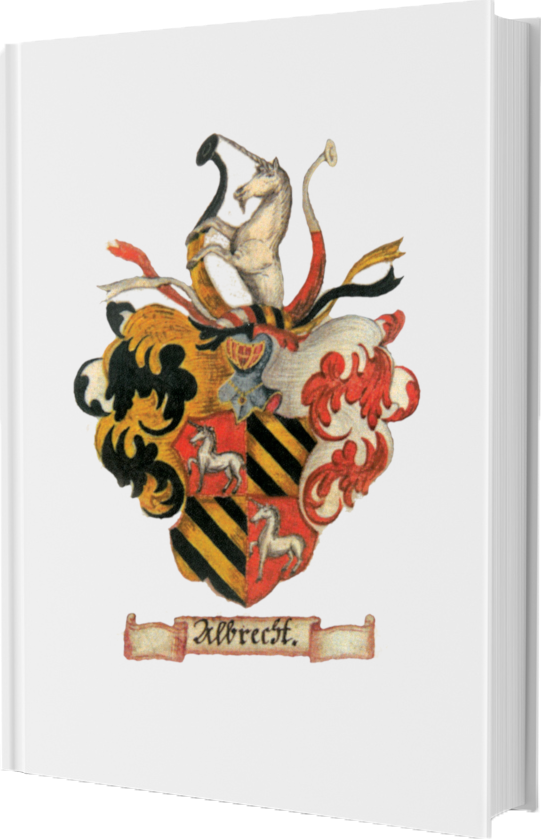Dr. Johann Georg Albrecht’s
Original Music Scripts
Johann Albrecht wrote and presented this poem in 1648 when he was 18 years old. The original is located at the Department of Manuscripts and Early Printed Books, University Library, Würzburg:
Poem of consolation
For the premature but blissful departure and death of the noble and very honourable and virtuous woman
Susanna1Susanna Schnepf (née Ruffer) was the godmother of Johann Georg Albrecht’s future wife Anna Magdalena Walther. From Epitaph of Anna Magdalena Albrecht. Printed in 1703. From the Stadtarchiv (State Archive) Rothenburg ob der Tauber, Milchmarkt 2, 91541, Rothenburg ob der Tauber. Pp. 26–27. Much loved credit to the house of the noble and honourable, caring, highly sage Johann Georg Schnepf, Senior mayor of the imperial city Rotenburg auf der Tauber:
Arranged as a poem addressing this person and translated for four voices by Johann Georg Albrecht, lover of music and the free arts.
Printed at Rothenburg ob der Tauber by Martin Wachenhäuser, 1648.
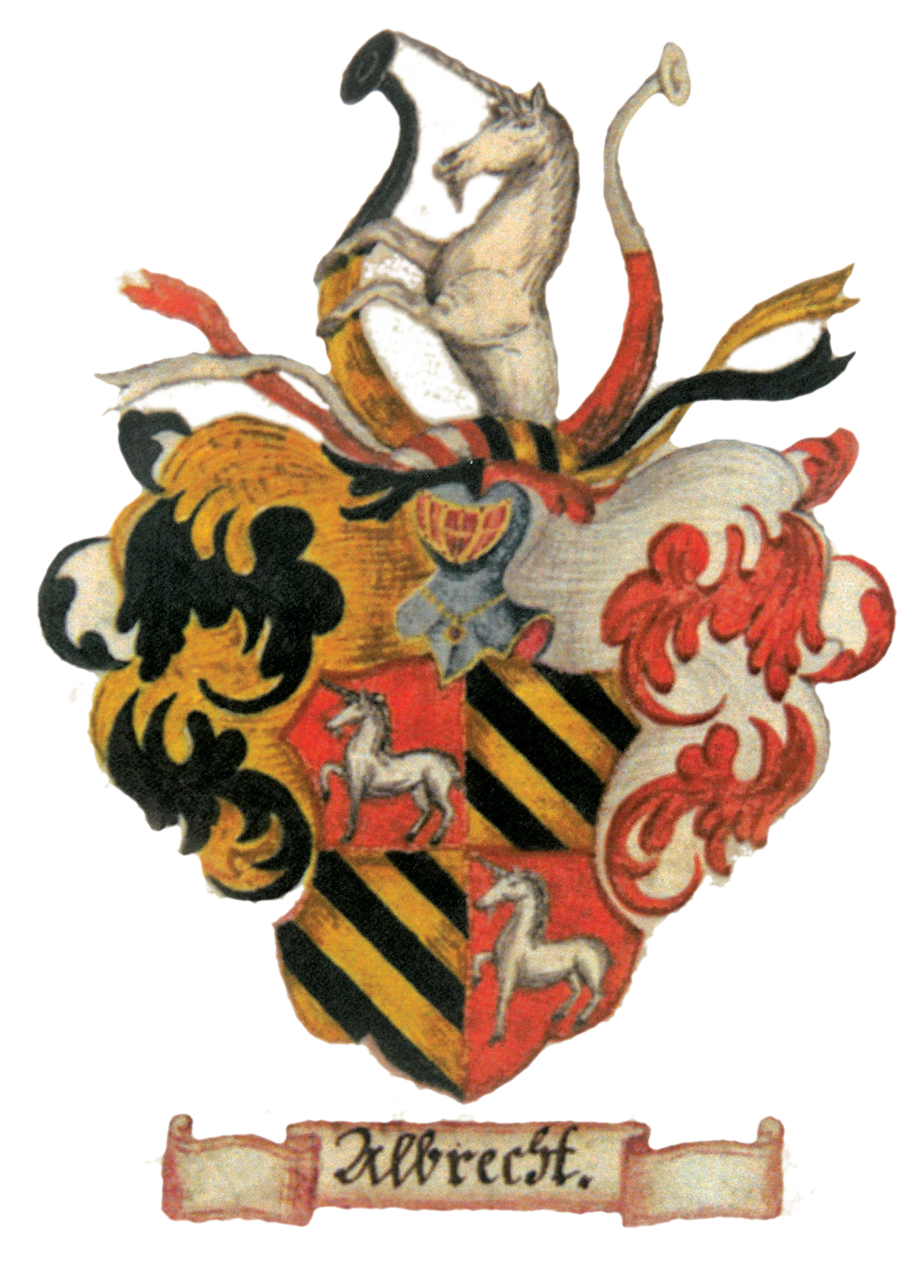
Poem
Dearest / let yourself not be in sorrow / because I am not distressed any more now.
Pale cheeks / wet eyes / heart and soul full of grief / hurt you / and don’t help me / I feel at ease forever / at ease forever.
Although you might weep over the fact / that I have departed:
However, soothe your yearning / be moderate in it.
To those who have happily run the course of death / Heavan is open / and they can’t return.
What I previously often have desired / and Do you want to mourn forever / and cry over my death?
Wished for every day / I don’t need any more / because I am able to see Christ
Therefore, stop your worrying / grant me my peace now:
Think about the fact / that God can lead you to me again tomorrow.
You should only mourn those / who are snatched away by death quickly / without belief / unawares
And one should never be allowed to complain / if a blessed death saves you in your belief
Snatches and carries you away
And carries you towards heaven2Department of Manuscripts and Early Printed Books, University Library, Würzburg
Original Manuscripts
Verse 1
So hat der Schwan sein Abschiedslied gespielet? Hat er sich abgeküh-let in Karons Kahn und mit bered-ter Zungen zu Grabe sich gesungen, zu Grabe sich gesungen.
Verse 1
So, has the swan played his good-bye song? Has he cooled down in Karon’s boat and sung himself to his grave with eloquent tongues, sung himself to his grave.
Verse 2
Mein End mach gut* war seine letz-te Stimme: Herr, meinen Geist hinnim-me! Halt ob ihm Hut, auf Gott leg ich mich nieder, ach! Schöne Schwanenlieder! Ach! Schöne Schwanenlieder!
Verse 2
Make my end good*, was the last he voiced: Lord, take my spirit! Guard it well, on God I will lay myself down, oh! Beautiful swan songs! Oh! Beautiful swan songs!
Verse 3
Was sonst ein Schwan vermerkt sein Ster-bensende wird er zur Sonnenwen-de und geht voran zu kühlen Was-serflüssen sie letztmals zu begrüßen, sie letztmals zu begrüßen.
Verse 3
What else does a swan do at the end of his life, he makes his way to the cool waterways at the time of the solstice to greet them one last time,to greet them one last time.
Verse 4
Er singt so lang bis eine Flu-tenhölle verschlang die süße Keh-le samt dem Gesang, sein Leib wird ihmein Bette der Bach zur Lagerstätte, der Bach zur Lagerstätte.
Verse 4
He sings until the hellish torrents devour his sweet throat with all its song, the river becomes a bed for his body, a bed for his body.
Verse 5
Viel sanfter ruht hier unser Schwan beym Bronnen* von welchem ist geron-nen das edle Blut als dessen ro-te Flüsse sind lauter Lebensgüsse, sind lauter Lebensgüsse.
Verse 5
Our swan rests much more gently at the springs*, from which ran the noble blood in red rivers which are gushes of life, are gushes of life.
Verse 6
Bey diesem Strand hat unser Schwan gekirret, sein Sterbelied abgeswir-ret, in dieses Hand* hat er sich ein-geschlossen und Himmelskraft genossen, und Himmelskraft genossen.
Verse 6
Our swan rested at this beach, he finished his death song, he enclosed himself in this hand and enjoyed the power of heaven, and enjoyed the power of heaven.
Verse 7
Herr, meine Seel nimm auf in dei-ne Wunden, die mich so oft verbun-den, wann aus der Höll des Leibs (sang er) mein Singen nach mir wird nimmer klingen, nach mir wird nimmer klingen.
Verse 6
Our swan rested at this beach, he finished his death song, he enclosed himself in this hand and enjoyed the power of heaven, and enjoyed the power of heaven.
Verse 8
Glückloser Fluss der Tauber, der die Hölle hier unsrer Schwanenkeh-le zuletzt sein muss; sollst du mit Le-bensgaben ihn nicht belabet haben? Ihn nicht belabet haben?
Verse 8
Hapless river Tauber, who will be the hellish end for our swan’s throat; shouldn’t you have refreshed him with gifts of life? Refreshed him with gifts of life?
Verse 9
Zwar große Gunst hat ihm deine Flut erwiesen, wie ers dann stets geprie-sen nun eitler Dunst! Der Schwan liegt bey den Flüssen, dem Sängerchor entrissen, dem Sängerchor entrissen.
Verse 9
Although your floods have granted him great favours, which he always praised, it is now idle mist! The swan is lying beside the rivers, ripped away from the singers’ choir, ripped away from the singers’ choir.
Verse 10
Kommt allher an, ihr Nymphen und Dryaden, ihr schwarzen Orea-den; helft unsern Schwan mit Tränen und mit Ächzen bey seinem Grab belechzen, bey seinem Grab belechzen.
Verse 10
Come along, you nymphs and dryads, you black Oreads; help our swan with tears and moans, to moisten his grave, to moisten his grave.
Verse 11
Mit Trauerflor umhüllet das Gesichte und singet Trauergedich-te beym Musikchor mit Wehmuth vol len Zungen: Der Schwan hat ausgesungen, der Schwan hat ausgesungen.
Verse 1
So, has the swan played his good-bye song? Has he cooled down in Karon’s boat and sung himself to his grave with eloquent tongues, sung himself to his grave.
Verse 11
Faces wrapped in black veils and tongues full of wistfulness, the music choir is singing mournful poems: The swan sang for the last time, the swan sang for the last time.
Swan song
At Dr Johann Albrecht’s funeral in 1703, a special funeral song was sung in his honour, called the Swan Song. Associate Professor Samantha Owens, from the Victoria University of Wellington, has commented on it as follows:“The relative simplicity of the musical setting of Johann Georg Albrecht’s ‘swan song’ is in keeping with trends regarding funeral music at the time. While Lutheran funeral music has flourished during the 17th century, particularly c. 1650–79, by the 1670s, traditional funeral customs, such as sumptuous ceremonies and solemn processions, were starting to lose favour. Nevertheless, funeral compositions and their performances did continue to form a major part of early modern musical life and its repertoire, so this piece for Albrecht is quite typical of its time (particularly for a leading citizen).”
